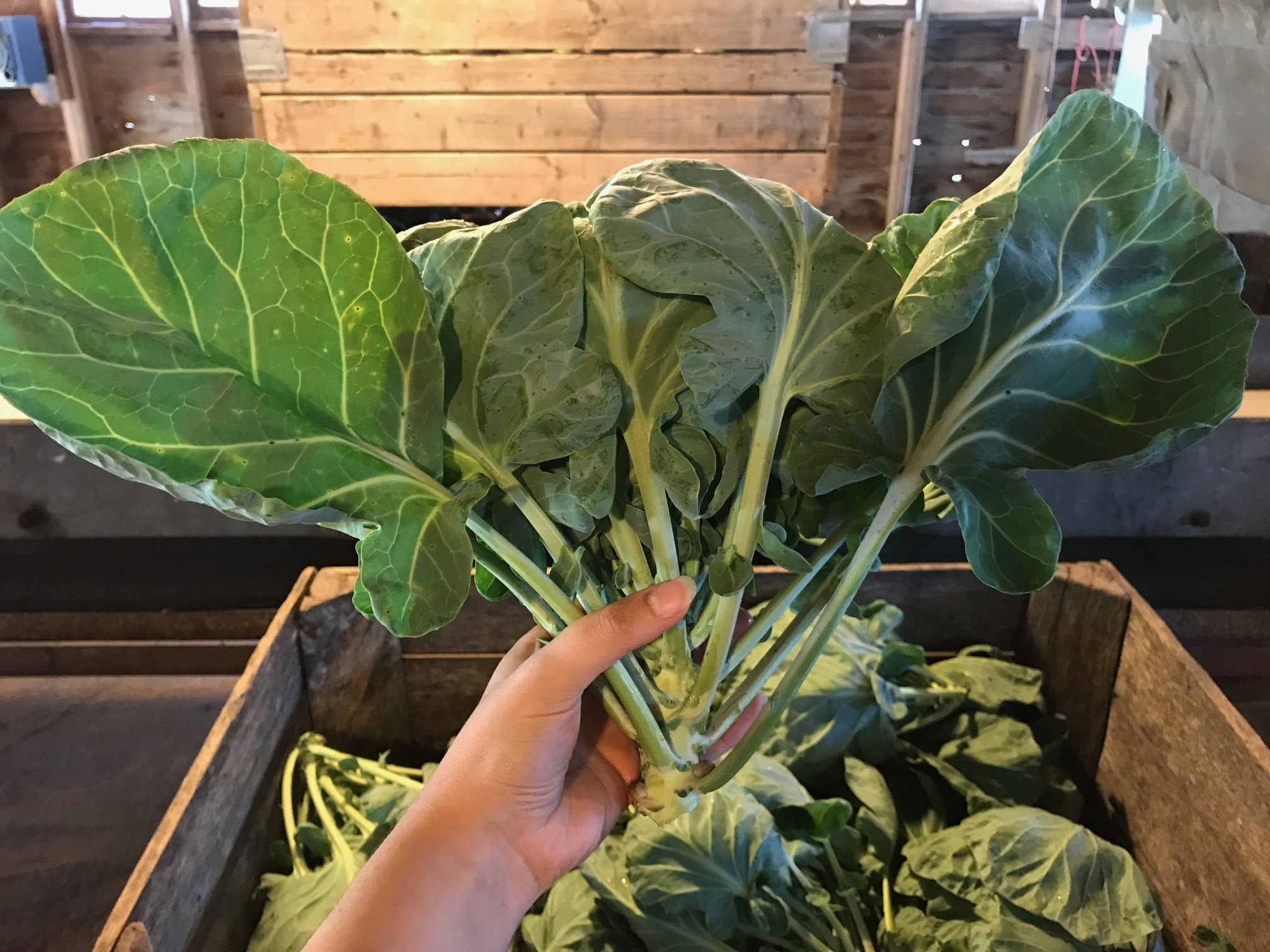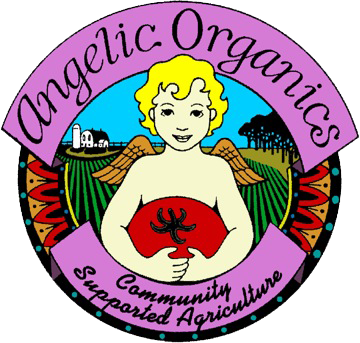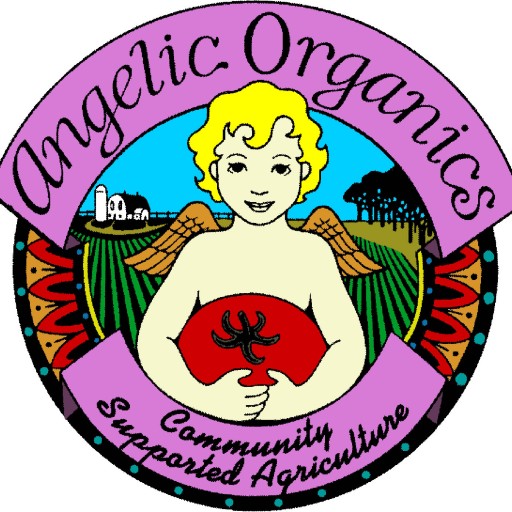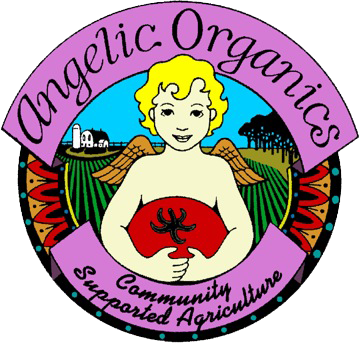Farmer John Writes: The Farm or Paris?
Week 15, September 19th – 23rd
Your Box This Week —Saturday Deliveries:
Please note: this summary is written before we pack your box—be aware that some guesswork is involved. As always, be sure to thoroughly wash all of your vegetables.
Fruiting Crops — Delicata Squash, Pie Pumpkin
Brassicas — Broccoli or Cauliflower
Cooking Greens — Brussels Sprouts Tops
Root Crops — Radishes
Salad Greens — Baby Lettuce Mix (in bag), Pea Shoots (in bag) , Head Lettuce or Pac Choi
Brussels Sprouts Tops Are Tops
Last year, we discovered that the tops of Brussels sprouts are a rare gourmet treasure for many, so we are including them in your box this week. We remove the tops of our Brussels sprouts plants (and the lower leaves) to encourage the sprouts to fill out more. Check out your Local Thyme recipe service for more on Brussels sprouts tops. Except for the flooding in the lower part of the field, the Brussels sprouts look good this year. The Brussels sprouts themselves will be in your boxes later.

Brussels sprouts tops
Great Turnout for our Field Day
About 300 people attended the Field Day this past Saturday. The hay wagons creaked with shareholders, and creaked even more when the shareholders got back on the wagons with their pumpkins and gourds (and basil, too, though the large, leafy bags of basil they harvested didn’t add to the creaking.)
I gave tractor rides to 10 or 12 kids while giving the hay rides. Though the rides were brief, it’s a most special time to have a child or young adult in the passenger seat of the Deere, and to get to know them a bit.
The Potluck
Over 100 entrees and desserts were provided by the shareholders. The ratio of entree to dessert was about two to one. The entrees crowded the 50 foot long food line. The twelve quiches that Beloit’s Bagels & More made with ingredients from our fields were gone in a twinkle.
The huge maple table in the barn kitchen was graced with the most desserts ever. They were squeezed closer and closer together to make room for more and more desserts, and they were pushed further and further to the center of the wide table to make even more room. It was dessert paradise. By the end of the lunch, with some people going back for seconds, the desserts were all gone, as were all of the entrees.

Desserts galore
Our Shareholders
Two full hay wagons of shareholders, plus cars, plus a jogger, caravanned a half mile east down Rockton Road for a robust sneak preview of the pastoral overnight facility, the Lodge of the Angelic Organics Learning Center—robust because there was a crew diligently plastering the walls to hasten the project towards completion.
The Field Day had the biggest turnout in years. I mentioned to a wagon load of shareholders that this was what had happened at Woodstock, where the organizers had prepared for a reasonably sized crowd and got surprised.
Many shareholders sought me out to tell me that they read every issue of Farm News with great interest. Many shared that the CSA is a most important part of their lives.
A most lovely shareholder said, “I had a flight booked to Paris, leaving this morning. I cancelled the flight. I felt it was more important to visit the farm than to visit Paris.”
A Drought, Really?
For the hayrides, I pulled the wagon up on a knoll near the popcorn field at the west end of the farm and pointed out a sweep of lowland that had completely flooded out our crops. We could view the 1/4 mile long swale that engulfed and ended the lower plantings of melons, fall brassicas, winter squash, then coursed diagonally through smaller sections of the basil, eggplant, and peppers, and then spread out into a wide, destructive swath of the tomatoes. I also pointed out the upper slope of the melon fields where water seeped, perhaps gushed, out of the hillside and killed the melons—a phenomenon I have seen maybe two or three times in my 60 years of farming.
An astute shareholder asked, “would drainage tile have helped?”
I replied, “that lower area is tiled. The tile couldn’t handle it.”
Unprecedented Fall Irrigation
Peas
You may have already read enough in former newsletters about this disastrous flooding, but I am pointing it out today because we are now in a drought. We have had no rain for weeks. Our soil which was subject to many weeks of water saturation has become brittle and hard. Working up the ground for fall cover crops has been very challenging, because the soil is so resistant. We eventually got most of the fields worked up and seeded to fall peas, but the pea seeds have been sitting in dust now for weeks. In prior seasons, rain has always come in time to germinate them. This season, we have been irrigating these fields to get the peas to germinate, as they need to experience some growth in order to contribute properly to next year’s fertility.
We have never irrigated our fall cover crops before, in order to germinate them.

Irrigating our fall peas
Potatoes
I’ll delve into this drought a bit further. We have been harvesting our potatoes, because a drought can give way to incessant rains in the fall and then it is very challenging to get the potatoes out of the mud. Our potato harvester usually does a great job of separating out clods of dirt from the potatoes, by pulverizing the clods. Last week, the clods of dirt were so hard that the harvester basically treated those clods like they were potatoes; it put them right into the bins with the potatoes. We irrigated the potatoes to soften the ground enough so those clods of dirt would crumble when they went through the machine, and only potatoes would get into the bins. The idea worked splendidly.
We have never irrigated our potatoes before, in order to harvest them.
Endlessly Interesting Weather
I’ve provided you with a sweeping and dramatic report of this year’s weather on your farm. Though I find weather endlessly interesting, I’m not especially inclined to overdramatize weather. My reflections on weather are seasoned by my long history of farming. Weather varies from year to year. I have mentioned in former issues of Farm News that people like to, perhaps need to, think that the current year’s weather is different from all previous years, as though they are endlessly in an exceptional weather moment.
South of us, of course, from the southern United States way down into the Caribbean, the weather this year has been different from all other years. Dramatic accounts of recent weather in those regions pale to the reality of the hardships here. However, in most parts of the country, in every day life, the shenanigans of weather lend themselves to hyperbole.
In Sometimes a Great Notion, Ken Kesey superbly conveys how a community in Northwest logging country in the early1960’s spoke endlessly every year about how different the weather was that year from every previous year. Since I was a child, I have noticed that people in this rural area where I grew up do the same–discuss how different the weather is this year from all other years in memory. I suppose it is, in the same way that every snowflake is different from every other snowflake.
I have seen dry weather followed by wet weather: wet weather followed by more wet weather; hot, dry weather escalate into a drought, finally broken by a cloudburst. It’s different from other years, people always say.
Still, this year’s weather on the farm is extreme, like the weather in 1955 when the normally peaceful Kinnikinnick Creek raged like a river and I, 6 years old, wailed while beholding it; like the weather in 1974 when the Kinnikinnick took out 5 nearby bridges in a row; like the weather in 1993, when our equipment seemed like it might disappear from view into sinkholes on hillsides. These epic weather events warrant dramatic accounts.
I wrote this in Mexico in the 80’s:
“In 1974 I had wanted to go to New York to act but I farmed instead. The rains came hard in the spring. The planting machinery sat drenched in waiting. I finished planting six weeks late. When the rains finally stopped, they stopped for the rest of the year. The earth baked and hardened, and many of the seedlings never emerged. What did emerge, curled and wilted under the searing July and August sun. What survived the summer sun was frozen dead on September 10, the earliest frost on the record.”
I suppose I’m qualified to declare that this year’s weather on the farm is different from other years—not all other years, but most.
Overheard
Customer: “You have no idea how hot it is outside”
Bank Teller: “I sure do”
Customer: “How’s that? You’re in this air conditioned bank all day long.”
Bank Teller: “I go outside and smoke”
Warmly,
Farmer John
Please Fold Your Boxes Properly and Return Them
The farm re-uses the vegetable boxes. Flaps are easily torn when the boxes are dismantled improperly, and then the box bottom might later burst open with fresh, organic local produce heading towards the floor. Please carefully flatten your box and return it to your delivery site. If you receive home delivery, place it in the location where your box is delivered.
Let us Know
Let our office know anything you’d like to share about this week’s box at email hidden; JavaScript is required. Please note the week and day of delivery, your site, when you picked up your box, and any comments about your box.
More from Shareholders
Visit us often at www.facebook.com/angelicorganics, where we post exciting farm developments regularly, and shareholders post recipes, tips, and photos.
Upcoming Events at Angelic Organics Learning Center
9/23-9/24 – Beginners Herbalism Weekend Come to the farm for two inspiring days with international herbalist & naturopath, Gigi Stafne. Herbs and natural remedies are discussed for each phase of life. Learn how to use them to cope with life stressors/toxins – and create remedies to take home! www.LearnGrowConnect.org/herbalism.



